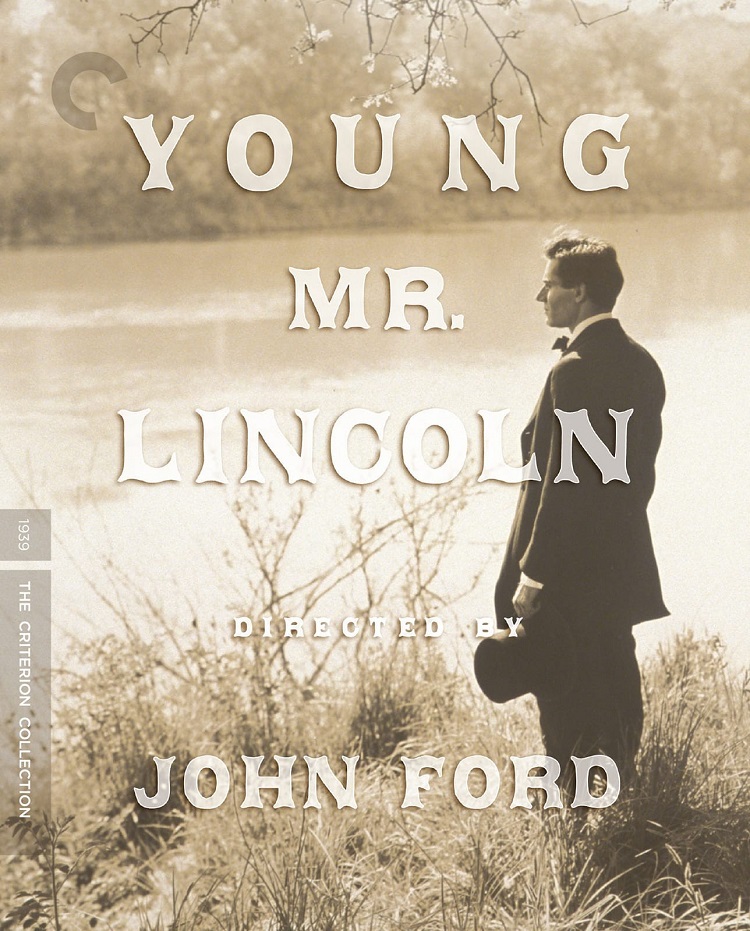
Young Mr. Lincoln (1939) may be the greatest overlooked film John Ford (1894 – 1973) ever made. To call a picture like this “overlooked” would be ridiculous in just about any other case. But Young Mr. Lincoln was one of three movies Ford directed that year. The other two were Drums Along the Mohawk (1939), and Best Picture nominee Stagecoach (1939). Ford’s own films are the competition, and I had no idea of just how good Young Mr. Lincoln was was until a friend gave me the two-DVD Criterion Collection edition of it.
The film opens in 1832, where young Abraham Lincoln (Henry Fonda) is running for the Legislature against a fat-cat hypocrite politician in New Salem, Illinois. Lincoln’s everyman appeal is immediately apparent: “My politics are short and sweet, like an old woman’s dance.” When he is given a law book from a family in exchange for some groceries, he discovers his calling. The loss of his beloved Ann Rutledge (Pauline Moore) seals it, and Lincoln moves to Springfield to practice law in April 1837.
These events occur within the first 15 minutes, and then it is time for Springfield’s annual Fourth of July celebration. This is where Lincoln meets Mary Todd (Marjorie Weaver). Ford makes sure that we see Lincoln as a man’s man here. He wins the rail-splitting contest and secures a victory in the tug-of-war contest by hooking the rope to a wagon. Was it cheating? Maybe, but Ford is showing us that Lincoln will do what it takes to win.
By nightfall, many jugs have been consumed and there is a fight just outside of town involving two brothers and another man. A shot is fired and a fourth man appears. The brothers are accused of murder, and since both claim innocence, the drunken mob wants to lynch them. Lincoln stops the crowd with an eloquent plea to let him defend his first client. With self-deprecating humor, he tells the crowd that since he will no doubt lose the case the brothers will hang later but legally.
The courtroom scenes are the heart of this film. While Young Mr. Lincoln is certainly not a murder mystery, it is a clever device to study a man’s character. Ford was famous for his pioneering use of the camera, especially in the wide open vistas of such places as Monument Valley. His camera work in the tiny courtroom is so off-center as to feel subversive. Every inch of the crowded space is filled with activity, and it all adds to the tension. Fonda as Lincoln is brilliant in these moments, defusing the energy and winning over the jury with his wry smile. When it counts, his steely gaze tells us everything we need to know about his strength of will.
Like so many of Ford’s films, Young Mr. Lincoln is a parable. In a sense, the cramped courtroom foreshadows the position he will find himself in as President. At the time of the Civil War, he will be boxed in again and forced to act. When Lincoln steps out of the Springfield courtroom to the cheers of the townspeople, the look on his face says it all. He seems to know what the future holds, as do we, and the moment is devastating.
The first DVD of the Criterion Collection set contains the film, and the second DVD is devoted to bonus material. “Omnibus: John Ford, Part One” (42:17) is an episode of the BBC program Omnibus with filmmaker Lindsay Anderson that aired on December 1, 1992. It features an in-depth look at Ford’s cinematic techniques, themes, and characters, from his humble beginnings all the way up to WWII. The next piece is “Parkinson: Meets Henry Fonda” (49:04), featuring Michael Parkinson interviewing Henry Fonda about his career and his work with John Ford. It originally aired on November 1, 1975.
The next two features are audio only. In 1973 and 1978 John Ford’s grandson Dan Ford recorded an interview with him (7:27) and in 1978 with Henry Fonda (4:31) as research for his book Pappy: The Life of John Ford (1998). The excerpts included here discuss their respective experiences in filming Young Mr. Lincoln. “Academy Award Theater” (29:52) was a short-lived show in which popular films were adapted into 30-minute radio dramas. The adaptation of Young Mr. Lincoln stars Henry Fonda, and originally aired on July 10, 1946. The Academy Award Theater episode can be played on DVD, and there is also an MP3 option.
The “Gallery,” features pages from Lamar Trotti’s final draft of the screenplay. These include detailed scenes that did not make the final cut. The one Academy Award nomination that Young Mr. Lincoln received was for Trotti’s screenplay, by the way. The gallery also includes an original film poster and an interesting letter from one of the giants of Russian cinema, Sergei Eisenstein (1898 – 1948) to Ford. Eisenstein was an unabashed fan, and his article “Mr. Lincoln by Mr. Ford” is reproduced in the accompanying booklet. The booklet also contains an essay titled “Hero in Waiting” by Geoffrey O’Brien.
As a nascent John Ford fan, I have been diligently working through his films as I find them. I began with the most well-known titles, and this is why it took me a while to reach Young Mr. Lincoln. I believe that it is one of his greatest works, and urge anyone who has not seen it to check out the Criterion Collection edition.